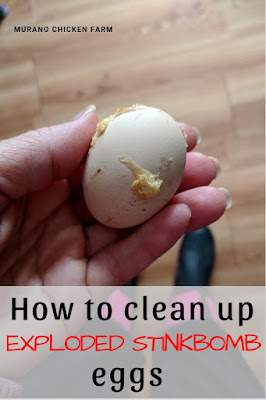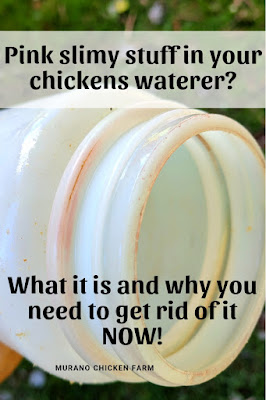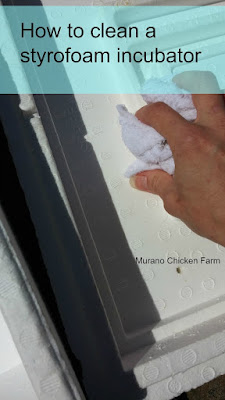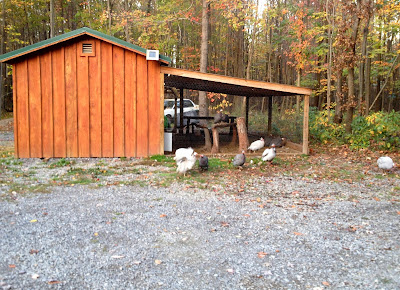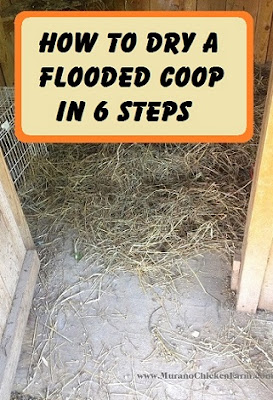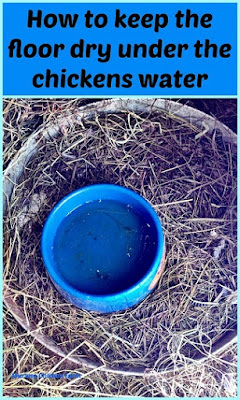How to clean up a rotten egg (after it exploded!)
You can blame that horrible rotten egg smell on sulfur. Or more specifically, the proteins that make up the egg.
From The Daily Meal: Eggs are very high in two proteins, globulin and keratin. When globulin begins to decay, a toxic chemical is released that’s called hydrogen sulfide, which has that very potent sulfur smell. Keratin also has very high levels of an amino acid called cysteine, which is full of sulfur atoms.
Add that to a partially formed chick decomposing inside the egg, and you're in for a world of stench!
Once the rotten egg goo escapes the egg it can be hard to clean up. Especially if it's on your skin, hair, clothes or incubator...not to mention all over your kitchen! Yuck! Unfortunately I've cleaned up a lot of eggs over the years and I've learned that it's not that difficult to clean up rotten egg. It just depends what the mess is on.
Don't worry...we'll get it cleaned up!
Preparing your chickens for Spring
As with the other seasons, a quick health check is in order. We should be looking all the chickens over for lice, mites, dirt balls (or poop balls) long nails, overgrown beaks etc etc on a regular basis.
However, I know a lot of us forget...me included! Making sure it gets done between seasons though, makes sure we don't go too long without checking!
This is the third in my seasonal series and you'll notice that inspecting the coop is always first on my list. A safe coop is your #1 line of defense against predators.
Unfortunately seasonal weather and time can take their toll on the coop allowing small holes or loose boards where predators can get in.
Personally, while I may be in the coop every single day that doesn't mean I'm looking around at it! These seasonal checklists remind me to take a closer look and make sure everything is in good shape.
Preparing your chickens for Spring
Check the coop: Give the coop a quick once over and check for holes or loose boards that may let predators in.As water freezes and thaws during winter it expands and contracts which can loosen boards, nails and hardware. Check the roof for leaks and patch them up before the spring rains begin.
Break out the brooder: Chick days are coming and whether you buy your new chicks each year or let your hens hatch them out, you'll want to have a brooder set up ready to go in case you need it.
Check to make sure all equipment is in working order before you bring chicks home.
Chicken waterers, how often should you clean them?
If you've ever gone to change the waterer and noticed a slimy sort of substance on the inside of it, you're not cleaning it often enough! I used to think it was just some sort of harmless water residue or debris accumulation and I would clean it out and not worry about it.
It's actually something called biofilm and it's a slimy film of bacteria that stick together to adhere to a surface.
How deep litter method works in chicken coops
I only clean my chicken coop once a year. Yes, you read that right. ONCE a YEAR. The best part though, is that my coop doesn't smell. At all! In fact, by the time I clean my coop all the bedding and chicken poop are so broken down, it's like shoveling dust.
When I first got my chickens, I cleaned the coop every 2 weeks. It wasn't exactly my favorite chore, but I chalked it up to one of those things I had to do and handled it. Then I discovered the deep litter method in a chicken forum discussion. Game changer.I've been using the deep litter method in my chicken coops for about 7 years now and it's the best thing that's happened to coop cleaning ... like, ever!
The deep litter method is exactly what it sounds like ... letting the coop litter get deep. In order to do that you don't clean it out from summer to spring. Just keep adding more every few weeks and stirring it up so it dries out and breaks down faster. Every week, add a little more litter and mix again.
The chickens dig around in it and mix it too, so that helps the whole process.
Preparing your chickens for Autumn
Since Autumn brings cooler weather, I focus on getting the chickens back to their pre-molt splendor and making sure they enter fall parasite free. I also check the safety and security of the chicken coop. We don't want any predators getting in during these cooler months, now do we? I add in a little bit of cleaning to get rid of some of the yuck from summer and call it done.
Now let's get started... this shouldn't take long at all!
Getting your chickens ready for fall
First, check the chicken coop to make sure there are no leaks coming from the roof, or water seeping in through the walls. Looks for holes and rotted wood. Make sure roost bars are still sturdy.
Check latches on doors and make sure windows close and lock. If you have electric in your chicken coop give that a look over too making sure all the wires are still in good shape.
Can I catch Histoplasmosis from chickens?
Yes it's all birds, not just chickens. However since keeping chickens entail things like cleaning the coop which stirs up chicken poop and bedding dust, you have a higher chance of catching histoplasmosis from your chickens then from random wild birds.
As you clean the coop you stir up these spores in the chicken poop and they become airborne, and you can then breathe them into your lungs.
Now before anybody panics, most people who contract histoplasmosis from chickens will have no or very few symptoms. In fact, many people that do contract histoplasmosis will think they have a mild cold or the flu.
Only about 10% of the people that contract histoplasmosis will develop serious eye or lung problems.
Related reading: Ocular Histoplasmosis, the bird droppings disease from Mother Earth news.
6 Ways to dispose of coop bedding
The coop litter situation gets real bad in the spring when it's time to clean out the coops that use the deep litter method. Those only get cleaned out once a year, but that's a lot of dirty bedding!
Add the smaller coops and brooders to that and you can see I have lots and lots of poopy coop litter to get rid of.
So how do you get rid of all that chicken poop?
How to Dispose of Coop Litter
1) Compost dirty coop litter
Dispose of the chicken poop by putting it in the compost pile. It's full of both the browns (litter like wood shavings) and the greens (poop) you need to build a good compost, so into the compost bin it goes! With the right additions you'll have black gold in no time.Plus the chickens will start digging through for anything they missed and turn it for you.
Here's How to compost chicken poop from Hobby Farms.
2) Dispose of coop litter in the garbage can
Be polite, bag it up so the retrieval guy doesn't get covered. For very small coops or flocks that live in the city, this litter disposal method might be the best option. Reuse your feed bags to bag up the litter for 2 reasons...You already have them and don't have to buy garbage bags
Feed bags are really sturdy and can be really loaded up without ripping.
3) Sell old coop litter/chicken manure
Gardeners will pay for chicken fertilizer even if they have to compost it themselves. Believe it or not, lots of folks are doing it and boy was I surprised to find that out! Advertise it in local farm groups, online bulletin boards or hang signs on bulletin boards at garden centers. Stick it in empty feed bags and sell it by the bag.Deep Litter method: the once a year clean up
About once a year however, it all needs to come out and we start all over again. I usually do this in spring as the coop seems to stay cleaner longer since the chickens want to be outside so much now! Don't forget to wear a dust mask when cleaning your chicken coop. Here's how I make coop dust masks. Cleaning it all up is a pretty easy process though, this is how I do it:
How to clean a styrofoam incubator
Ideally we should be sterilizing our incubators between every hatch to get rid of bacteria and egg residue. How many of us actually do this? (hides under chair)
So the question is do you know how to clean your incubator? There are many different types of incubators: Styrofoam, hard plastic and cabinet incubators are the most common. Today I want to talk about cleaning your Styrofoam incubator. If you happen to have a plastic incubator, don't worry...I gotcha covered too! Go here: How to Clean a Plastic Incubator. Ok, back to my Styrofoam incubator cleaning procedure.
Why you NEED an outdoor sink on a homestead
Of course I was often leaning over to pick it up off the ground, or sitting on the ground to use it. It wasn't very comfortable but it got the job done so why complain? Then came the day Mr Roboto saw an ad for a sink. Not just any sink, a 3 bowl stainless steel commercial kitchen sink.....with drainboards. It was being sold by a person who had bought an old church and was turning it into a thrift shop. The price was right (cheap) and it was in the truck and on it's way here in no time.
I wasn't sure about this idea at first. This thing was huge! It was almost as long as our guinea house is wide (12 foot) and ended up taking up residence right alongside it. He had plans to install hot and cold water and a permanent drain, but those are on hold briefly. For now it has a cold water hose attached to it and the water simply runs out of the drains and into the rocks below. I couldn't imagine using this enough to justify it sitting there.
Then begrudgingly I started using it. At first I put some hand soap out there and used to to wash up after gardening. Then I cleaned a few bowls in it, standing up instead of kneeling on the ground! The more I used it the more I realized that it really made keeping up with the chicken chores a whole lot easier. Now, I don't recommend you run out and buy a monster sink like this! However, I do believe that everyone who has chickens should have at least a small sink outside....and here is why:
Chore schedule for my day 'off'
It takes about 1/2 hour every morning to feed/water the chickens, switch out dirty bowls and let everyone out. In the evening it takes about another 1/2 hour to feed/water & count every bird then lock them all up for the night. Usually youngest son does afternoon feeding so I get to sit that one out. When I find some time during the week I scrape poop boards and fill feed bins. I clean out brooders at least twice a week. It only takes a few minutes here and there. Nobody really wants to come home from work and start cleaning coops, so the big cleaning comes on the weekend.
Chicken farm chores
This is what I did on my day off:Morning chores: 1/2 hour (feed, water & open doors)
Met with customers, gave farm tour: 1 hour
Moved chicks out of Silkie coop to grow-out pen, fixed led light in silkie coop: 1/2 hour
Cleaned Guinea coop (20X12 building): 1 hour
Chased Guineas back into coop: 15 minutes
Washed food and water bowls that have accumulated all week: 1/2 hour
Cleaned out the brooders in the garage: 15 minutes
Evening chores: 1/2 hour (fill waters, lock up & count them all)
How to dry out a wet chicken coop
The rain came so fast and furiously even the French drain failed and we were left with a huge mess to clean up.
First thing I did was scrape all the water out the door using a small shovel (and my feet...but hey, I was desperate!) Then I pushed the wet bedding onto the rubber mat that covers the back half of the coop. I let it spend the night back there....it was too late at that point, but the real work was to come in the morning!
10 Chicken Supplies from the Dollar Store
I buy lots of chicken supplies at the dollar store (I prefer Dollar Tree) Many are the same exact item and others need thrown out and replaced so often that I feel like I'm just throwing money away!
Here are 10 things I always buy at the dollar store and why. Keep in mind that even though many dollar stores are raising their prices now in 2025, it's often still cheaper to shop there for many of these items than grocery stores, Walmart, Target, Amazon etc.
I've added comparison prices and links if you want to order them online. Since many dollar stores have changed prices but many are still just one dollar, I highly suggest you take a visit to the local dollar store before ordering to compare prices.
How to keep the chicken coop floor dry under the waterer
I've tried putting the waterer up on blocks so the coop bedding doesn't get kicked in. I've tried putting the poultry waterer outside the coop (but I worried too much about them getting thirsty before I get up in the morning) We tried different types of drinkers and bowls, bottles and cups.
We tried pretty much everything we could find, and the bedding was still wet underneath the water font! A little bit of wet bedding isn't a big deal, but once it gets a little wet...it spreads and spreads till the whole floor is soaked. Yuck!
As if the wet bedding isn't enough of a problem, the floor underneath it is wood. Eventually wet wood starts to rot. That is all I need is a rotted spot on the coop floor! Not only would that be expensive to fix but I have to worry about predators finding it and tunneling into the coop before I can get it fixed! No thanks!
I needed to find a solution before the coop floor was ruined. Luckily I have some experience Using household objects in the chicken coop, so a solution wasn't far away!
Dollar store poop scraper
I'm a pretty big fan of using dollar store items for the chickens. I always buy dog bowls, puppy pee pads, band aids, sponges, baby bottle brushes, marbles, and colorful zip-ties at the Dollar Tree. In the Spring they also carry buckets and butterfly nets (good for catching chicks). Why pay more, right?
How do you save money on chicken supplies?
~L

